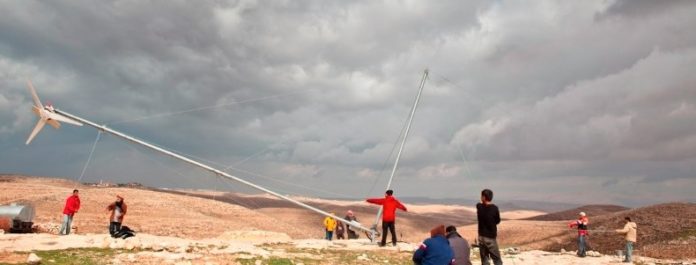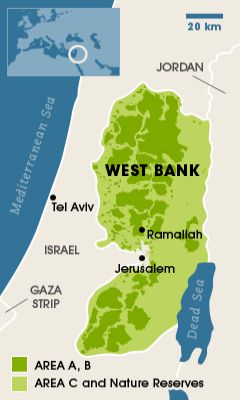
An Israeli-Palestinian NGO, Comet-ME, is using solar and wind energy to transform the lives of a marginalized community of Palestinian famers and shepherds in the Southern Hebron hills of the West Bank.
The Palestinians living in this part of the West Bank are mainly off-grid and either have no access to electricity and clean water at all, or use expensive diesel generators if they can afford. Area C, which covers two-thirds of the West Bank and is under Israeli control, is home to 300,000 Palestinians. Comet-ME says the Israeli soldiers refuse to provide energy to Palestinians and refuse to let them hook up to the electric power grids it installed for the Israeli settlements and settlement outposts, as part of a systematic campaign to push them off their lands, into Areas A and B. According to Haaretz, one of Israel’s oldest newspapers, residents’ every trip to get water can lead to a traffic ticket and a fine of NIS 1,500.
In 2009, Comet-ME co-founders, two Israeli physicists and anti-occupation activists, Elad Orian and Noam Dotan, approached the communities to look for ways they could help. Together, Comet-ME and the villagers designed and set up small-scale hybrid wind and solar mini-grids. So far Comet-ME has helped bring renewable energy to around 2,000 residents in 24 villages in the southern West Bank.
The energy devices provide an average of 2.5 kW h per family per day, providing electricity 24/7, 365 days a year. This is enough clean energy to run lights, recharge phones and watch TV, extending the family’s day well beyond sundown. The systems also power basic appliances such as refrigerators and butter churns, enabling the community to increase their production and sales of dairy products. Each family in the village is allotted electricity based on its relative size, and the villagers pay for it accordingly. According to one estimate, family incomes have grown by as much as 70% since the electric goods were introduced.
In 2013, Comet-ME, which is supported by the German government and works with Danish and Swiss NGOs, helped develop a controller that operates water pumps using surplus energy from the mini-grids to bring water from rain-storage cisterns to the families.
Citing the lack of permits, Israeli Civil Administration, West Bank’s governing body, has issued demolition orders for 15 of Comet-ME’s 25 installations. Orian told Haaretz, Comet-ME didn’t need permits because, “In principle, I don’t believe we have to ask for permits from an occupying force to supply basic services. And practically speaking, it is perfectly clear that if we ask for them, that will set in motion a complex, energy-draining process that will drag on for years and ultimately elicit a negative answer.”
South Mount Hebron is ideally suited for wind energy – as the sun goes down, the wind picks up. The region is on the edge of a desert, therefore full of sunlight; and 800 metres above sea level, therefore extremely windy. In the winter, there are powerful storms, with wind speeds exceeding 150 kilometres an hour.
This Article (Activists Defy Israeli Army, Light Up West Bank Village With Sustainable Energy) is free and open source. You have permission to republish this article under a Creative Commons license with attribution to the author and AnonHQ.com.










